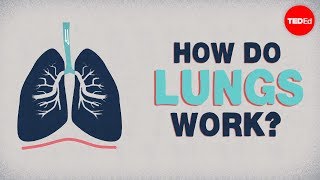(单词翻译:单击)
Many of us have hundreds of things on our minds at any moment,
我们会有许多事同时在脑海中出现,
often struggling to keep track of everything we need to do.
为了关注每一件必须做的事情我们需要花费许多功夫。
But fortunately, there's one important thing we don't have to worry about remembering: breathing.
但幸运的是,有一件重要的事不用花功夫去记,那就是呼吸。
When you breathe, you transport oxygen to the body's cells to keep them working
当你呼吸的时候,你将氧气传送到身体的细胞内,并保持它们一直工作,
and clear your system of the carbon dioxide that this work generates.
同时,也将细胞工作时产生的时二氧化碳清理出去。
Breathing, in other words, keeps the body alive.
呼吸,换句话说,使人活着。
So, how do we accomplish this crucial and complex task without even thinking about it?
那我们到底如何是在不经意的情况下完成这一项关键又复杂的任务的呢?
The answer lies in our body's respiratory system.
问题的答案藏在人体的呼吸系统内。
Like any machinery, it consists of specialized components, and requires a trigger to start functioning.
就像任何机器一样,呼吸系统有着许多不同的零件,为了开始工作,它还需要一个触发点。
Here, the components are the structures and tissues making up the lungs,
这里的所说的零件就是组成肺的结构与组织,
as well as the various other respiratory organs connected to them.
还有其他将所有连接在一起的呼吸器官。
And to get this machine moving, we need the autonomic nervous system,
为了使这座机器启动,我们需要自主神经系统的参与,
our brain's unconscious control center for the vital functions.
那就是大脑中掌控重要功能的潜意识控制中心。
As the body prepares to take in oxygen-rich air,
当人们的身体准备好接受氧气充足的空气时,
this system sends a signal to the muscles around your lungs, flattening the diaphragm
神经系统会发送一个信号给肺部的肌肉,使横膈膜变得扁平,
and contracting the intercostal muscles between your ribs to create more space for the lungs to expand.
并收缩肋骨中间的肋间肌,这是为了让肺扩张时有更多的空间。
Air then wooshes into your nose and mouth,
接着,空气被鼻子与口中吸入,
through your trachea, and into the bronchi that split at the trachea's base, with one entering each lung.
并通过气管,进入在气管底部分叉的支气管,两股空气分别流入两个肺中。

Like tree branches, these small tubes divide into thousands of tinier passages called bronchioles.
就像树枝一样,这些细小的气管还会有数以千计的更细的分叉,名叫细支气管。
It's tempting to think of the lungs as huge balloons,
肺很容易被以为类似一个巨大的气球,
but instead of being hollow, they're actually spongy inside, with the bronchioles running throughout the parenchyma tissue.
然而,肺的内部并非是空的,而是像海绵一样,细支气管遍布在肺部的薄壁组织中。
At the end of each bronchiole is a little air sack called an alveolus,
在每一根细支气管的底端都有一个名叫肺泡的空气囊,
wrapped in capillaries full of red blood cells containing special proteins called hemoglobin.
这个气囊被充满红细胞的毛细血管包裹着,红细胞中包含着特殊的蛋白质,名叫血红蛋白。
The air you've breathed in fills these sacks, causing the lungs to inflate.
吸进的空气便会充满着些气囊,并且使得肺部扩张。
Here is where the vital exchange occurs.
这就是关键的交换之地。
At this point, the capillaries are packed with carbon dioxide, and the air sacks are full of oxygen.
此刻,毛细血管中挤满了二氧化碳,而气囊中则充满了氧气。
But due to the basic process of diffusion,
按照基本的扩散原理,
the molecules of each gas want to move to a place where there's a lower concentration of their kind.
所有气体中的分子都会想要移动到一个同类分子密度较低的地方。
So as oxygen crosses over to the capillaries, the hemoglobin grabs it up, while the carbon dioxide is unloaded into the lungs.
所以,氧气将会进入毛细血管,血红蛋白会抓住这些氧气,而二氧化碳则会被填入肺中。
The oxygen-rich hemoglobin is then transported throughout the body via the bloodstream.
然后,充满氧气的血红蛋白会随血流传送到身体各处。
But what do our lungs do with all that carbon dioxide? Exhale it, of course.
但是,当我们的肺部充满着二氧化碳时,它会做什么呢?当然是将其呼出。
The autonomic nervous system kicks in again, causing the diaphragm to ball up,
这时,自主神经系统又介入其中,让横膈膜上移,
and the intercostal muscles to relax, making the chest cavities smaller and forcing the lungs to compress.
肋间肌放松,使得胸腔变小,从而迫使肺部压缩。
The carbon dioxide-rich air is expelled, and the cycle begins again.
充满二氧化碳的气体就这样被排出体外,循环便会再次开始。
So that's how these spongy organs keep our bodies efficiently supplied with air.
这就是这些海绵一样的器官使我们的身体一直有着充足气体的支撑的方法。
Lungs inhale and exhale between 15 and 25 times a minute, which amounts to an incredible 10,000 liters of air each day.
肺部吸气与呼气在一分钟可进行15到25次,每一天都会有10000公升气体介入。
That's a lot of work, but don't sweat it.
这是一项巨大的工作,但千万不用担心。
Your lungs and your autonomic nervous system have got it covered.
你的肺和自主神经系统会统统搞定。


